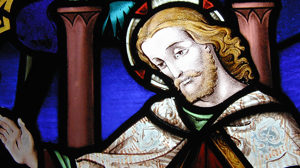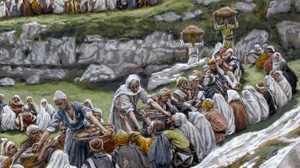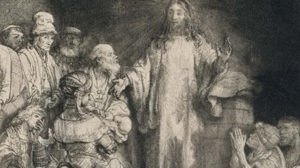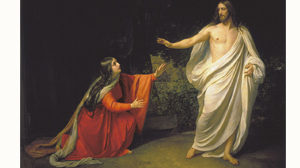Exodus 40:16-21, 34-38
Matthew 13:47-53
Reflection:
In our first reading today we see Moses building a Dwelling for the Lord. “He (Moses) brought the ark into the Dwelling…” Later we read, “Then a cloud covered the meeting tent and the glory of the Lord filled the Dwelling.” “In the daytime the cloud of the Lord was seen over the Dwelling; whereas at night fire was seen in the cloud by the whole house of the Isreal in all the stages of their journey.” With the ark, the cloud and fire, the Israelites were very conscious of the presence of the Lord in their midst.
What came to mind is our use of the red sanctuary lamp in our churches. When it is burning it alerts us that the Lord is present in the Blessed Sacrament in the tabernacle. So we genuflect or bow when we enter the church. But if this candle alerts us to the presence of Jesus, it could be used in other ways, too. For instance we could place it by the Ambo. Vatican II tells us that Jesus “is present in his Word, for it is he himself who speaks when the holy Scriptures are read in the Church.”
This candle could be placed on my head. Vatican II says, “In the sacrifice of the Mass, he (Jesus) is present in the person of the priest.”
Jesus told us that, “where two or three are gathered in my name, there am I in the midst of them.” (Matthew 18:20) That means this candle could be placed in the middle of the assembly gathered for Mass.
Jesus also told us that, “whatsoever you do to the least of my people, you do to me.” (Matthew 25:40) Jesus is present in our neighbor in need, esp. the poor. So we could place this candle in skid row. He is there. Mother Teresa was one person who was very much aware of this.
And finally, we could place this candle right next to your heart and mine. St. John tells us that, “God is love, and those who abide in love abide in God and God in them.” (John 4:16) Is there love in your heart? I trust there is. God is present within you.
Holy Eucharist, the proclaimed Word of God, the priest, the gathered faithful, the poor, our hearts… Yes, there are many places we encounter the risen Lord.
At the Last Supper, Jesus prayed to his Father, “Father, I desire that they also, whom you have given me, may be with me where I am…” (John 17:24) Whether in clouds and fire, or Word and Sacrament, it is mindboggling that the Lord of the universe wants to be with little us. We bow our heads in awe, wonder, — and gratitude.
Fr. Alan Phillip, C.P. is a member of the Passionist Community at Mater Dolorosa Retreat Center, Sierra Madre, California. Visit his website: http://www.alanphillipcp.com/.








